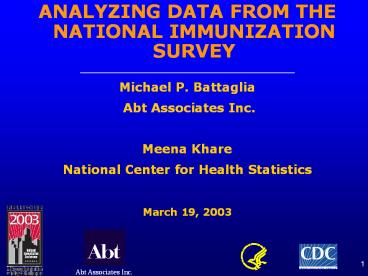ANALYZING DATA FROM THE NATIONAL IMMUNIZATION SURVEY - PowerPoint PPT Presentation
Title:
ANALYZING DATA FROM THE NATIONAL IMMUNIZATION SURVEY
Description:
Combine 4 adjacent quarters to obtain annualized estimates. 3. NIS SAMPLE DESIGN (CONT. ... Age at vaccination in days. 17. GUIDELINES FOR USING NIS PUFs ... – PowerPoint PPT presentation
Number of Views:144
Avg rating:3.0/5.0
Title: ANALYZING DATA FROM THE NATIONAL IMMUNIZATION SURVEY
1
- ANALYZING DATA FROM THE NATIONAL IMMUNIZATION
SURVEY - __________________________________________
- Michael P. Battaglia
- Abt Associates Inc.
- Meena Khare
- National Center for Health Statistics
- March 19, 2003
2
NIS SAMPLE DESIGN
- Quarterly list-assisted random-digit-dialing
(RDD) sample of telephone numbers - 78 geographic strata (IAP areas)
- Combine 4 adjacent quarters to obtain annualized
estimates
3
NIS SAMPLE DESIGN (CONT.)
- Collect information on all age-eligible children
in the household (HH) - Stratified single-stage cluster sample design
4
SAMPLE WEIGHTING
- Children with completed household interviews
- Base sampling weight
- Adjustment for multiple voice-use phone lines in
HH - Three level unit nonresponse adjustment
5
SAMPLE WEIGHTING (CONT.)
- Children with completed household interviews
- Poststratify to NCHS Natality File control totals
within each IAP area by age category of child,
race/ethnicity of mother and maternal education
6
SAMPLE WEIGHTING (CONT.)
- Children with completed household interviews
- Modified poststratification used to compensate
for exclusion of nontelephone children (uses NHIS
immunization Supplement data on vaccination
up-to-date status of nontelephone versus
telephone children) - New method based on telephone households that
reported an interruption in telephone service of
one week or longer in the past year recognizes
that nontelephone population is dynamic rather
than static
7
SAMPLE WEIGHTING (CONT.)
- In 2001, 30 of children did not have adequate
provider data for use in estimation - Children with adequate provider data
- Use response propensity model with
socio-demographic predictors from RDD survey - Within each IAP area divide children into (5)
response propensity quintiles - Adjust weights of children with adequate provider
data in each response propensity quintile
8
NIS ESTIMATES
- The 1995 to 2001 NIS PUFs contains two
child-level weights - HY_WGT is the household interview weight variable
for each child. It should be used to produce
estimates for children with completed household
interviews.
9
NIS ESTIMATESS (CONT.)
- W0 is the child-level weight for the children
with adequate provider data - This weight should be used to produce estimates
of vaccination coverage rates.
10
STANDARD ERRORS
- Information in the PUF can be used to calculate
standard errors of the vaccination coverage rates
that reflect the complex sample design and
weighting used in the NIS - Software for analyzing complex sample designs
includes SAS, SUDAAN and STATA
11
SUBGROUP ESTIMATES
- Demographic and socioeconomic variables in the
file can be used to obtain national vaccination
coverage rates for subgroups of the population - Data users should, however, be aware that
estimates for such subgroups at the state or
IAP-area level will have larger standard errors
because of the smaller sample sizes
12
STRUCTURE OF NIS PUBLIC-USE FILES
- Each PUF consists of two primary levels of data
- Data for all children with completed HH
interviews - Data for all children with adequate provider data
13
STRUCTURE OF NIS PUFs (CONT.)
- The phrase "children with adequate provider data"
refers to children for whom sufficient
vaccination history information is obtained from
their providers to determine whether they are
up-to-date with respect to the recommended
vaccination schedule.
14
AVAILABILITY OF NIS SAMPLE
Year Number of Children with HH Interviews Number of Children with Adequate Provider Data
1995 31,997 16,183
1996 33,305 21,099
1997 32,742 22,806
1998 32,511 21,827
1999 34,442 22,521
2000 34,087 22,958
2001 33,437 22,531
15
COMPOSITE VARIABLES
- Household composite variables Include
- Up-to-date status on individual vaccinations
- Up-to-date status on selected vaccine series
(e.g., 4313, 43133 series) - Race of child and mother, household income
- Child ever have chicken pox?
16
COMPOSITE VARIABLES (CONT.)PROVIDER DATA
COMPOSITE VARIABLES INCLUDE
- Vaccine-specific number of doses
- Up-to-date status indicators for individual
vaccines and vaccine series (e.g., 4313,
43133 series) - Age at vaccination in months
- Age at vaccination in days
17
GUIDELINES FOR USING NIS PUFs
- Documentation available -- README, Data Users
Guide, Accessing and Analyzing Data from the NIS
Public-Use Data, and the Code Book - The data file is available in ASCII format
- A program is provided on the NIS web site and
CD-ROMs for SAS users to convert the ASCII file
to a SAS dataset
18
GUIDELINES FOR USING NIS PUFs (CONT.)
- For estimates by geographic area (e.g., Maine)
use the entire file and the SUBPOPN command in
SUDAAN or just select the cases that belong the
the specific geographic area (standard errors
will be the same) - If only interested in vaccination coverage
estimates, just select children with PDAT 1 - Combining multiple years of NIS data to increase
sample size of children within IAP areas and
states see 2000 or 2001 Data Users Guide for
instructions and cautions
19
GUIDELINES FOR USING NIS PUFs (CONT.)
- SUDAAN EXAMPLE 1
- NSEQNUMH 1SEQNUMHH
- PROC SORT BY ITRUEIAP NSEQNUMH
- PROC CROSSTAB DATASUD_FILE FILETYPESAS
DESIGNWR - WEIGHT W0
- NEST ITRUEIAP NSEQNUMH
- SUBGROUP STATE PUTD43133
- LEVELS 51 2
- TABLES STATE PUTD43133
20
(No Transcript)
21
(No Transcript)
22
GUIDELINES FOR USING NIS PUFs (CONT.)
SUDAAN EXAMPLE 2 NSEQNUMH 1SEQNUMHH PROC
SORT BY ITRUEIAP NSEQNUMH PROC CROSSTAB
DATASUD_FILE FILETYPESAS DESIGNWR WEIGHT
W0 NEST ITRUEIAP NSEQNUMH SUBGROUP INCPOV1R
RACEKIDR PUTD43133 LEVELS 3 4 2 TABLES
(INCPOV1RRACEKIDR PUTD43133)
23
(No Transcript)
24
(No Transcript)
25
TO OBTAIN INSTRUCTIONS, NIS CODE BOOKS, NIS DATA
USERS GUIDES, AND SAS PROGRAMS TO ANALYZE NIS
DATA, VISIT THE NIS WEB PAGE
- http//www.cdc.gov/nis































